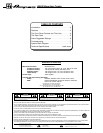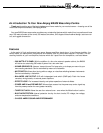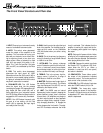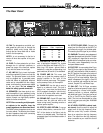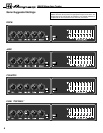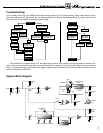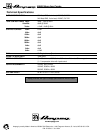
5
The Rear Panel
BA500 Bass Amp Combo
15 16 17 18 21 2219 20 23 24 25 26 27
15. FAN: The temperature controlled, vari-
able speed fan pulls cool air through the
amplifier’s intake vents, forcing heat out
through the fan. Never block the air intake
holes or the fan opening.
NOTE: It is not uncommon for the fan to
remain off when the amplifier is first pow-
ered up.
16. FUSE: The fuse protects the unit from
damage due to overload conditions or
power line surges. If the fuse fails, replace
it only with the same size and type.
17. AC LINE IN: Firmly insert the female
end of the supplied AC power cord into this
socket. The grounded power cord should
only be plugged into a grounded power
outlet that meets all applicable electrical
codes and is compatible with the voltage,
power, and frequency requirements stated
on the rear panel. Do not attempt to
defeat the safety ground connection.
18. SPEAKERS: Use these jacks to con-
nect the amplifier to your speaker(s) using
cables terminated with the appropriate con-
nectors. Always use high-quality speaker
cables for these connections.
NOTE: When connecting multiple speak-
er cabinets to the amplifier, keep the
overall impedance at or above two ohms!
The BA500’s internal speakers count as one
four ohm cabinet. The following chart shows
the total impedance load when connecting
speaker cabinets in parallel:
19. FOOTSWITCH: Use this jack to con-
nect a two-button footswitch for remote
control of the Mute and Graphic EQ. Tip =
Mute, ring = EQ, sleeve = ground. When a
footswitch is used the corresponding front
panel switches (#2 and #11) are disabled.
20. POWER AMP IN: This mono jack
allows you to feed the preamp output of
another amplifier to the input of the
BA500’s internal power amp. This bypass-
es the preamp circuitry of the amplifier.
21. TUNER OUT: Use this jack to send a
signal to an electronic tuner. This jack is
always “live,” even when the Mute switch
(#2) is engaged, allowing for “silent tuning”
as well as a monitor feed which remains
active when the speakers are muted.
22. PREAMP OUT: A post-EQ signal may
be taken from this jack and sent to the
house mixing board, recording console or
external power amplifier.
23. EFFECTS LOOP RETURN: To use an
external effects device, connect the OUT-
PUT of the device to the Return jack by
means of a shielded cable. This feeds the
processed signal into the Master section of
the BA500.
24. EFFECTS LOOP SEND: Connect the
output from the Send jack to the INPUT of
your effects by means of a shielded cable.
This sends a post-EQ signal to your effects.
25. -20dB/0dB: This switch, when depressed,
attenuates the output level at the Bal. Out jack
(#27), resulting in a signal that is more com-
patible with the microphone inputs on a mixer.
This switch works independently from the
front panel Master control.
26. POST/PRE: You can select either Pre or
Post EQ for the signal at the Balanced Out
jack (#27) with this switch. With the switch in
the OUT position, the signal at the jacks will
be Pre-EQ. This is a direct output not affect-
ed by any EQ or boost settings. When the
switch is depressed, the signal is Post-EQ
and is controlled and modified by the tone
controls, Graphic EQ, and Effects Loop.
27. BAL. OUT: This XLR-type connector
supplies a balanced preamp output signal
for connecting to a house mixing board,
recording console or external amplifiers
with balanced inputs. The signal can be set
to Pre or Post EQ by the Post/Pre switch
(#26). The level can be adjusted for either
mic or line type inputs using the -20dB/0dB
switch (#25).
28. HF LEVEL CONTROL (cabinet back,
not shown): Use this control to adjust the
output level of the high frequency driver.
With the control fully counter clockwise,
there is no output from the high frequency
driver. The output from the high frequency
driver increases as you rotate this control
clockwise.
Cabinet # of Total
Impedance Cabs Impedance
4Ω 22Ω
8Ω 24Ω
8Ω 42Ω
16Ω 28Ω
16Ω 44Ω




